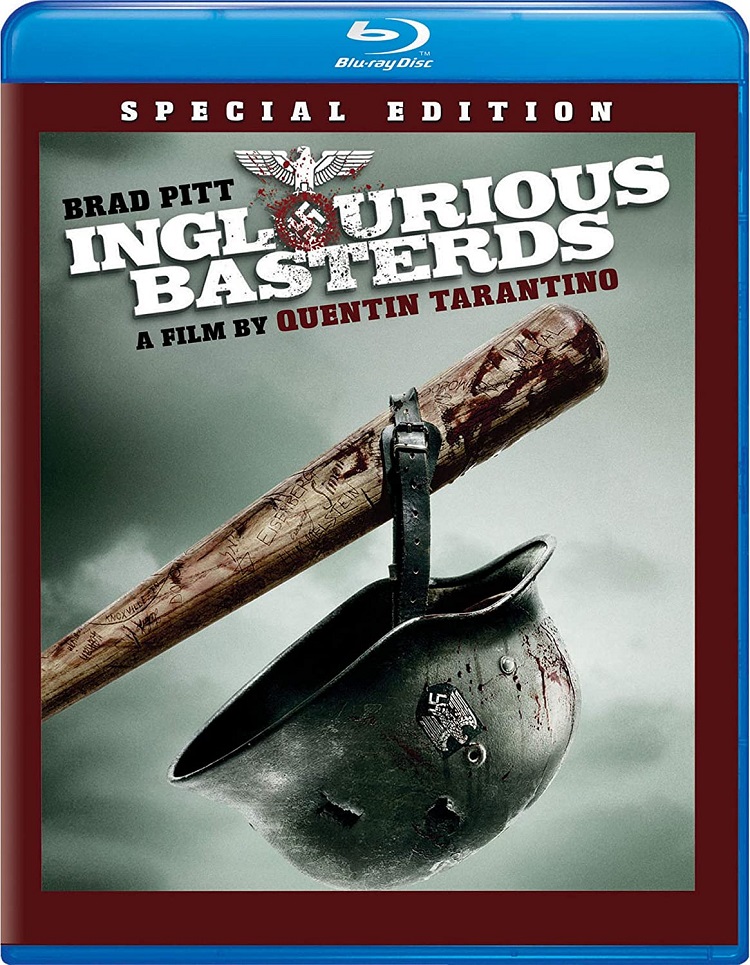
Written by Mule
Inglourious Basterds (2009) directed by Quantin Tarantino stars Mélanie Laurent (Shosanna Dreyfus), Christoph Waltz (Col. Hans Landa), Brad Pitt (Lt.Aldo Raine), Eli Roth (Sgt. Donny Donowitz), Michael Fassbender (Archie Hicox), Diane Kruger (Bridget von Hammersmark), Daniel Brühl (Fredrick Zoller), Til Schweiger (Hugo Stiglitz), Sylvester Groth (Joseph Goebbels), Martin Wuttke (Adolph Hitler), Rod Taylor (Winston Churchill) et al.
There is always a lot going on in Tarantino’s movies, and that is putting it mildly. Not only are they riddled and rife with movie connections and intertextuality, references to more or less obscure movie stars and directors, but in this case there is also the whole of World War II’s history to take into account.
The movie itself is divided into five chapters: 1 – Once Upon a Time In Nazi Occupied France, 2 – Inglourious Basterds, 3 – German Nights in Paris, 4 – Operation Kino, 5 – Revenge of the Giant Face. Just looking at the titles of the chapters you know what universe you are in. Without searching too deeply you can see the references to Spaghetti Westerns and sundry other cinematic allusions.
The story follows a few key characters, most importantly Shosanna Dreyfus (Mélanie Laurent), Col. Hans Landa (Christoph Waltz) and Aldo Raine (Brad Pitt). In true Tarantino-tradition each of the separate storylines overlap and tie into each other in complex and intricate ways.
Shosanna survives the massacre of her family by the hand of Col. Landa in the first chapter. Aldo Raine is the leader of a group of Jewish soldiers dropped behind enemy lines in France with the sole express purpose of killing Nazi officials and military as messily as possible. Their cruelty quickly becomes legendary and they are referred to as the “inglorious bastards” giving the movie its title.
Through a series of circumstance the German war hero Frederick Zoller (Daniel Brühl) takes a shine to Shosanna who is active in Paris as the owner of a movie theatre. Zoller wants the premiere of the movie glorifying his efforts as a sniper portrayed in a movie-within-the-movie called “Stolz der Nation” (“A Nation’s Pride”) to be at her theatre. Goebbels (Sylvester Groth) sees this as an excellent opportunity to boost morale and bring all the higher officials of Nazi military together in one place.
Little does either Zoller or Goebbels know that Shosanna is part of the resistance and she also has a personal stake in staging a large scale assassination of all the top Nazi brass. Another of Tarantino’s prevalent themes comes into play in this, the revenge-movie, characteristically with a female in the lead.
As events unfold Shosanna, Hans Landa and Aldo Raine are going to crash and converge at this red carpet affaire, along with Goebbels, Zoller, Hitler (Martin Wuttke) and other well-known Nazi leaders. Raine is posing as the escort of the actress Bridget von Hammersmark (Diane Kruger) who looks and acts like the epitome of every movie star of the period.
As always with Tarantino, it is the performances of the actors and the brilliant casting that elevates what could have been just a glorious mess into something more. Christoph Waltz as the multilinguist and all around bad guy Hans Landa is a thing of beauty to watch. He gets to show off his linguistic skills and plays sweet and charming one moment and a completely cold-hearted killer the next. Brad Pitt is so cartoonishly American that he makes me grin, Mélanie Laurent is quaintly French and at the same time shows a core of iron, playing scenes like the lunch Shosanna has with Zoller and Goebbels with a restraint that accentuates the tension until you can pretty much feel her vibrate from sheer stress. The supporting cast is cleverly chosen and used so well that even random-Nazi-soldier-Nr. 3-in-the-background contributes something to the overall.
The movie walks that same fine line between the serious and the silly that most of Tarantino’s production does and he manages to stay within the parameters well enough that it never becomes pastiche, but stays in the realm of homage and that is not an easy feat.
This is alternate history and it serves up the kind of twist that you hope for with something like that. It is also, sometimes perhaps despite itself, a clever comment on the fact that reality and truth are pretty much inseparable from fiction, fantasy and down right lying, even when we are dealing with our immediate history.
Postmodernism is dead, or so I have been told. The sociologist Zygmunt Bauman favours the term “liquid modernity” and talks about how the individual must estimate likely gains and losses of acting under the conditions of endemic uncertainly. Tarantino has always been the poster boy for postmodernism in a way, because of his acute awareness of the very fictionality of the medium. It doesn’t seem wrong that he can use David Bowie’s “Cat People (Putting Out Fire)” over a the scene where Shosanna gets ready to assassinate an entire movie theatre full of Nazi top brass by setting fire to a huge pile of nitrate film. That’s what I mean when I say there’s a lot going on. You can parse meaning out of that until you have gotten well and truly lost in your own intertextual grid.
Inglourious Basterds is visceral, visual, violent, brash, funny, awkward and feeds off itself and all other movie iconography until it’s saturated. The dialogue is brilliant and multilingual and the performances are really stellar. And the movie manages to do all that while still being a fun ride.